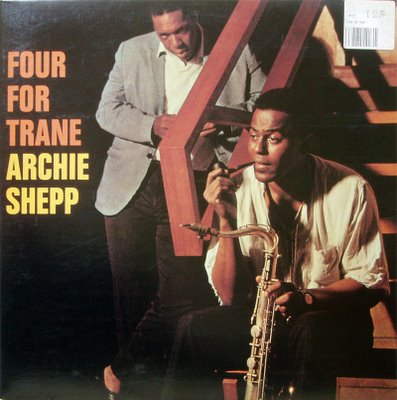Monday, October 31, 2005
Jazz Blogs, part 2
Recorda-Me
One man's attempt to review his entire record collection, starting with Archie Shepp. Good choice. Check it out and give some feedback - us amateur reviewers thrive on it!
Attic Beats
A podcast, not really jazz, but with an Archie Shepp edition (that man again, I just can't get enough Archie) featuring some very tasty tracks, especially "Yasmina". Go get it.
Street Knowledge
Not just jazz again, but a very nice mp3 blog featuring "conscious" artists of all genres.
How far out is too far out?

Picture of Ornette Coleman, a free jazz saxophonist of some reknown.
Sunday, October 30, 2005
Sheer Madness
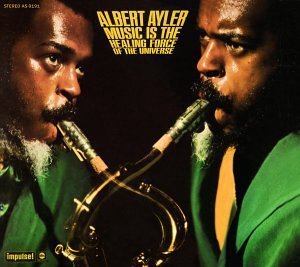 ALBERT AYLER
ALBERT AYLERMusic is the Healing Force of the Universe
impulse! AS-9191
Stereo
Recorded 1969
1. Music is the Healing Force of the Universe
2. Masonic Inborn, part 1
3. A Man is Like a Tree
4. Oh! The Love of Life
5. Island Harvest
6. Drudgery
Personnel
| Albert Ayler Tenor Saxophone, bagpipes, Vocal |
| Bobby Few Piano |
| Henry Vestine Guitar |
| Bill Folwell Bass |
| Stafford James Bass |
| Muhammad Ali Drums |
| Mary Maria Vocal |
OK, so there is some pretty crazy music out there, but this must take some sort of prize for being as mad as they come. From one of Ayler's final sessions before his untimely death in 1970, this is apparently a move from Free Jazz into something inflenced by R&B (according to the sleevenote). On what planet, exactly, are the bagpipes considered central to R&B? When did you last hear an R&B record with no discernible rhythm or melody? With a mad woman spouting mystical poetry over the top of it all? To be fair, the final track, 'Drudgery' actually does pay a passing resemblance to an R&B 45, but it's only passing.
This record is, though, rather more than the sum of it's parts. Ayler's playing is fascinating throughout, especially so on 'Masonic Inborn part 1', the track featuring the bagpipes playing a circular 'theme' - well, going through similar intervals in a similar way, at least. The drumming is also worth a mention - basically each track is treated by the drummer as an ectended solo spot, but it still all fits in and works with the other players. I am continually overawed by how these guys do it. And then, just when you think it couldn't get any odder, 'Island Harvest' kicks in with it's infectious (infectious - not a word normally associated with free jazz) calypso groove.
There are few words to describe a record as strange, as alien as this. So i won't attempt to find any. Just listen to it. The official impulse! site has a few sound clips which are reccomended listening for all of you with open ears.


Saturday, October 29, 2005
Archie Shepp - Things Have Got To Change
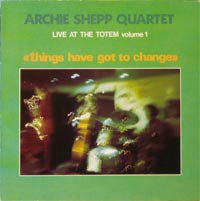
ARCHIE SHEPP QUARTET
Things Have Got To Change: Live at the Totem Vol. 1
Marge Productions MARGE 08
Recorded 9th January 1979
Side One
1. Poem For Mama Rose
2. Things Have Got To Change
Side Two
1. Things Have Got To Change (continues from side 1)
2. Giant Steps
Personnel
ARCHIE SHEPP; tenor saxophone
SIEGFRIED KESSLER; piano
BOB CUNNINGHAM; drums
CLIFFORD JARVIS; drums
CHEIK TIDIANE FALL; vocal, congas
I know I’ve only just done an Archie Shepp record, but it’s really got me listening to him, so here’s another with a Coltrane connection, featuring as it does a reading of ‘Giant Steps’.
First, though, is the ‘Poem for Mama Rose’, one of his many spoken word introductions, accompanied by some groovy percussion from the band, before launching into the massive ‘Things Have Got To Change’. I say massive, because weighing in at over half an hour in length, it’s split across the two sides of this LP.
In style, the playing is not far from his late 60’s free jazz days. It’s laid out in the standard theme-solos-theme pattern, and is very much in tempo, but there any comparison to traditional hard bop fails. This is inventive, innovative, searching music. Shepp sounds as if he’s trying to reach as yet undiscovered places on his saxophone, blowing out with everything he can muster, producing sounds that are alternately sweet and melodic, then harsh and atonal.
He’s playing as a quartet here, and perhaps it’s this as much as his sound and style here, but I’m very much reminded of John Coltrane’s classic 1960’s quartet. The rhythm section plays in a style very similar to that well-regarded combo. The piano accompaniment is spare; the bass ties everything down while fully exploring the harmonic possibilities of the tune, and the drums… Well, much could be said about the drums on this track. I don’t think I’ve ever heard a drummer keep a sense of forward propulsion while exploring his kit in quite so flamboyant a manner. Yes, it’s all in tempo, but every bar is different rhythmically. You might say that could be too much, and overwhelm the soloist, but Shepp responds with more invention of his own, and the two create a positive spiral which leads the listener to a peak of enjoyment. This tenor/drums interplay, that makes this disc such an exciting listen, is another aspect that reminds me of Coltrane – I’m thinking, of course, of the 60’s quartet again and the wonderful support Trane received from the great Elvin Jones. It’s often been said that Archie owed a great deal to John Coltrane, and I do wonder if he was conscious of this in his choice of a quartet for this date – surely he must have been to choose a tune like ‘Giant Steps’.
After 16 minutes (what energy Shepp has, playing at the relentless tempo of this piece for such a time), Shepp lays out and lets the pianist have a say. The piano playing, whilst supportive to Shepp (although the drummer steals the show, as far as the sidemen go, as mentioned above), is less good solo. The playing is interesting, and has some interesting sounding moments, with dissonancies and a little atonality, but doesn’t really sound like it’s connected to the rest of the band somehow, a fact picked up on by Shepp who returns a few minutes later (after turning the record over – a masterstroke of timing – if it had to be turned over at all, in the middle of that piano solo was the place to do it) and has to fight with the piano for a short time before it gets back to it’s subservient role. The sax, after it’s short break gives us more of the same – short lyrical bursts of the theme in typical hard bop fashion combined with moments of free expression and supporting drumming of great excitement.
With such excitement being generated by the drummer, it comes as no surprise that his solo, about 5 ½ minutes into the second part, is outstanding. It never ceases to amaze me how these drummers can simultaneously keep time but yet explore the outer reaches of their kit. I’m also continually amazed at how many sounds they can produce from only a few drums.
The tune soon ends, but there’s no respite as the band launch straight into ‘Giant Steps’, taken a shade faster than the Coltrane original. As soon as the tenor starts to solo, you know you’re dealing with Coltrane’s sonic heir. It may as well be JC playing, such is the speed and precision of what’s being put down here. The fine interplay between sax and drums is evident again here, with solid support from the bass. Once again, though, the piano lets the side down, though you do tend to ignore it and focus on the swirling horn lines when you’re listening. And on they go, swirling, darting and diving all over the map, with occasional breaths for air in the form of a statement of the theme.
Then, when you didn’t think it could get any better… the piano solo here is simply a work of genius. What this pianist was doing the rest of the time I have no idea, but here he plays with great invention and is both adventurous and controlled in his harmonics at the same time. The track soon winds up, though not until Archie and the drummer get to trade lines in a thrilling face-off of the albums’ two outstanding players.
I presume there’s a volume 2 of this release – but where to find it I have no idea. In the 5 years I’ve owned this LP I’ve yet to come across it’s twin. It’s on an obscure, presumably French label, it may even be a bootleg (the excellent sound quality rather mitigates against that). Maybe someday… and if anyone has any information they could share about this pair of recordings, then please leave a comment.

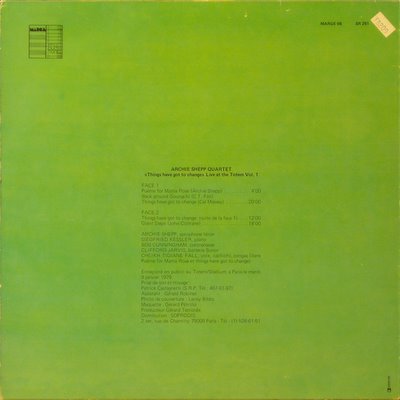
Friday, October 28, 2005
The Music of Charles Brackeen

CHARLES BRACKEEN
Rhythm X
Strata East SES 19736
Dolphy Series 4
Recorded January 1968
Side One
1. Rhythm X 8:03
2. Hour Glass 11:31
Side Two
1. Charles Concept 7:50
2. C.B. Blues 7:00
Personnel
EDWARD BLACKWELL; drums
CHARLES BRACKEEN; saxophone
DON CHERRY; trumpet
CHARLIE HADEN; bass
This is an intriguing LP by an obscure sax player. He may be obscure, but he certainly can play. This LP pairs him up with what is basically Ornette Coleman’s rhythm section in a recording of 4 Brackeen compositions. As you might expect from the personnel, the mood is one of freedom, but the pieces are in tempo, and ‘Rhythm X’ in particular could even be said to have a groove – think of Pharoah Sander’s ‘Black Unity’. Unfortunately, the quality of the sound is not as good as it could be – the horns, and even the bass come through well, but Blackwell sounds like he’s playing a couple of old tea chests. It’s a testament to the quality of his playing that he still manages to mesmerise with his solo towards the end of the first track.
The playing is uniformly excellent. Cherry, Blackwell and Haden’s credentials are already well established, and Brackeen is more than a match for them. Amazingly, despite such quality playing, Brackeen didn’t record a session under his own name again until 1987! He was, however, married to post-bop pianist Joanne Brackeen, who was much more prolific throughout the 1970’s, 80’s and 90’s.
The design and artwork is also excellent – the front sleeve depicts the personnel during the recording of the album, while the rear sleeve contains an uncredited abstract drawing that I assume is the work of Brackeen. The LP itself is a reissue of the original 1968 set, and is part of the ‘Dolphy Series’ – anything carrying the name of that outsanding musician must be worth a listen. The other albums in the Dolphy series are;
1. Clifford Jordan – In The World Strata-East SES 19721
2. Pharoah Sanders – Izipho Zam (My Gifts) Strata-East SES 19733
3. Zodiac – The Music of Cecil Payne Strata-East SES 19734
On the basis of this one, I’d highly recommend anyone with a passing interest in avant-garde jazz to go out and get hold of them all.


Monday, October 24, 2005
Archie Shepp - Four For Trane
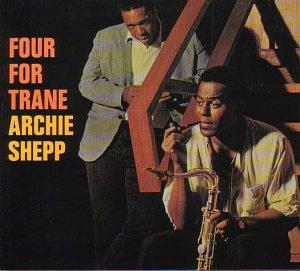
Archie Shepp
Four for Trane
Impulse! A-71
Stereo
1964
Side 1
- Syeeda’s Song Flute
- Mr. Syms
Side 2
- Cousin Mary
- Naima
- Rufus (Swung his face at last to the wind, then his neck snapped)
Personnel
ARCHIE SHEPP; tenor sax
JOHN TCHICAI; alto sax
ALAN SHORTER; trumpet
ROSWELL RUDD; trombone
REGGIE WORKMAN; bass
CHARLES MOFFETT; drums
Around this time, after some of the great tenor players that had come up over the preceding few years – figures like Coltrane, Rollins, Coleman – there was much talk of the ‘new’ thing, played by the ‘new’ tenors, the leading light of which was Archie Shepp. He had already made a splash with the New York Contemporary Five, playing in the emerging free jazz style as inspired by the likes of Ornette Coleman, Albert Ayler and Cecil Taylor. As a mark of respect from one of the new players to the leading member of the ‘old’ guard (and the guy who got him a contract with impulse!, no doubt), Archie Shepp went into the studio and cut stellar versions of four classic Coltrane tunes.
I say classic – they all dated from only a few years previously, 3 of the 4 cuts being from Trane’s classic ‘Giant Steps’, with the other being slightly later. And what tracks they are, too. “Syeeda’s Song Flute”. “Mr. Syms”. “Cousin Mary”. “Naima”. All arranged for a larger band with 4 times as many horns as Coltrane intended. ‘Naima’ is the standout track. What was a tender ballad in Coltrane’s hands – a reverential description of the love for his (then) wife – here becomes a spiky, angular exploration of sound. The famous opening theme is taken apart note by note and passed around the band in carefree form, in what is probably the most thrilling opening theme on the album. This is what happens when you take a solo saxophone line and split it between several horn players, and the result is electrifying.
This track is also a highlight for Shepp’s outstanding tenor playing, his sometimes abrasive tone softening during a solo section where the whole band lays out and gives Archie some room to breathe. Ah yes, to breathe. This is such a beautifully produced record that you can actually hear him breathing between phrases, and it just fits into the mood of the piece so well. And then, after the mood has become hushed, the track fades into a false ending and the band come back, playing at a much faster tempo, with a superlative trombone solo by Rudd, before heading back to the theme. This track ranks as one of the finest jazz recordings made, in my opinion – an already excellent track in Coltrane’s hands, given new vigour and an excellent arrangement by some of Jazz’s leading young players.
The other pieces are typically interpreted loosely by Shepp; 'Syeeda's Song Flute', in particular, keeps the tune and style of the original, but dispenses with Trane's smooth sound and introduces a much harsher tone. Indeed, Shepp was once described as 'a sheep in wolf's clothing', and this labum does much to prove that statement - despite his aggressive tone, he can play tunefully, and beatifully at some points.
The closing ‘Rufus’ is a Shepp original, and is a fine example of the freer style of the ‘New Thing’ that he was such a leading proponent of at the time.
The other players on the album are in good form too. Alan Shorter (Wayne's brother) more than keeps up his end on trumpet, while Roswell Rudd is always good value on trombone. The rhythm section is both propulsive and explorative, a quality often to be heard in Reggie Workman's recordings. Charles Moffett is a fine drummer - also reccomended is his work with Ornette Coleman on the live "At the Golden Circle, Stockholm" albums.
Links
Here's a link to an interview with Archie about music in general, which is well worth a read.
Archie Shepp's Official Site
Friday, October 21, 2005
Awards Night 1
1. The 'Better Than It Has Any Right To Be' Award
Awarded for excellence against the odds, be they old age, dodgy sleeve art, or bringing out a record in the 1980's - or in this case, all 3.
And the winner is...
SONNY ROLLINS
NO PROBLEM
Milestone NM 3003
Stereo
Recorded Dec. 9-15, 1981
The 1980's. Not a good time for production. Not tractors, or cans of beans, but musical production. But occasionally the early electronic tools of the trade were put to good use, as in this really rather good set from 1981. It had to be worth a punt, featuring Bobby Hutcherson on vibes and Tony Williams on drums along with Sonny. The great thing is that the big man's tone has survived completely unscathed amongst the calypso rhythms and casio keyboards. There's even some decent soloing from the whole band. There's not a duff track on it, unbelievably. And the best thing - the mood of the whole set is so upbeat that you just can't help but fall in love with it. I mean, look at Sonny's face on the sleeve. This is music that makes you happy, and sometimes that's all you need.
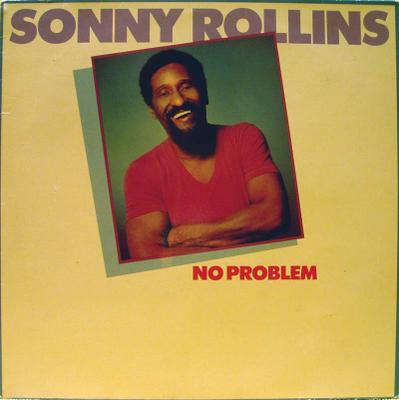
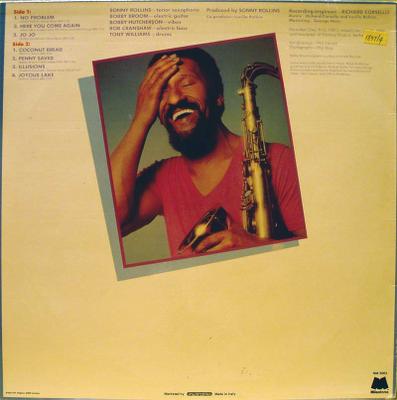
Runner up...
Special mention has to go to Buddy Rich for the superlative "Three Day Sucker" - see this post.
Thursday, October 20, 2005
Herbie Hancock - The Prisoner
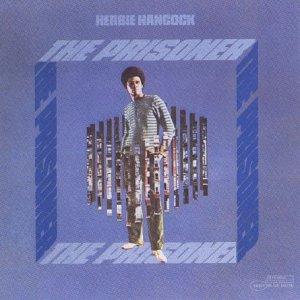
Herbie hancock
The prisoner
Blue note BST-84321
Recorded at Rudy Van Gelder, April 18,21 & 23, 1969
1. I Have A Dream (Hancock)
2. The Prisoner (Hancock)
3. Firewater (*) (Williams)
4. He Who Lives In Fear (Hancock)
5. Promise of the Sun (*) (Hancock)
Personnel
JOHNNY COLES, flugelhorn
JOE HENDERSON, tenor sax and alto flute
GARNETT BROWN, trombone
HERBIE HANCOCK, piano and electric piano
BUSTER WILLIAMS, bass
ALBERT "TOOTIE" HEATH, drums
HUBERT LAWS, flute
JEROME RICHARDSON, bass clarinet (and flute on (*))
ROMEO PENQUE (*), bass clarinet
TONY STUDD, bass trombone
JACK JEFFERS (*), bass trombone
Herbie hancock is one of the great names of jazz. Indeed, he still plays very well from what I’ve heard. But most of the attention is lavished on two periods in his enormously varied career – his early Blue Note sides (My Point Of View, Empyrean Isles, et al.) and the 70’s funk gems like Headhunters and Thrust. Great albums all, but much of his career gets unfairly overlooked, and there are a few 'lost' Hancock albums, like this one. It’s not really had much of a life, being briefly issued on cd in the 80’s before vanishing and reappearing in the 1990’s. It’s a beautifully produced Rudy Van Gelder recording and is now available as one of Blue Note’s desirable RVG editions (mine's a 1990's reissue - with japanese sleevenotes, so i've had to put in more work than usual finding out about this LP).
The music is some of Hancock’s finest. It's post-bop, but much more melodic than what he had just been doing with Miles (he'd just left the great 60's quintet). It also gives a nod towards the sort of funk he’d be plying in the mid 70’s as well as introducing the space (the space – sometimes it’s the bits you don’t hear that mark out a great herbie hancock record) that would feature in his recordings with the Mwandishi band in the coming years.
Undoubtedly the stand out track is the opener, “I have a dream”. As the title suggests, it’s a tribute piece to Martin Luther King. Instead of raw anger turned into raw emotion (see Archie Shepp’s ‘Attica Blues’), this is contemplative music that suggests Dr. King’s love of peaceful protest. Herbie really stretches out over the tracks 10 minutes, playing some fine melodic lines with a feeling of great reverence. His large band also contributes some excellent supportive play – the rhythms are continually inventive whilst remaining in an addictive groove, and the soloing of Joe Henderson and Johnny Coles is every bit as good as Herbie’s.
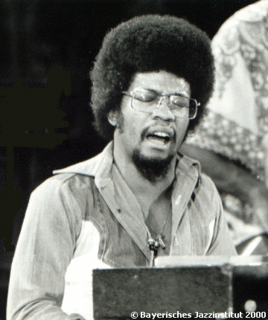
The rest of the album struggles to live up to the opener, sadly, but sounds fantastic throughout due to the lovely warm production that so well suits the meditative mood of much of the music. It’s as if the band had pulled out “I have a dream” and were so in awe of it that they tried to repeat it’s success – and of course that never works out well. Not that the other tracks are bad, mind you, just not as good. Special mention for the bass clarinet playing on “Firewater” – well played, and what a great sounding instrument. You just know that a guy called Romeo Penque is going to be able to play great jazz. Nice ensemble playing on this track, too.
Where did Herbie go next? Big funk, briefly (fat albert rotunda) then off to the stratosphere with the Mwandishi band and all the Dr. Patrick Gleason influenced electronics. But this album captures him beautifully when his music was still purely jazz, while still showing his ability to pioneer new sounds.
Herbie Hancock Links
Herbie at Blue Note Records
Official Site
Wilson & Alroy's Record Reviews - with mini reviews of lots of his albums
Herbie at Verve Records
Wikipedia article on Herb, with a good discography
Wednesday, October 19, 2005
Jazz Blogs
Jazz and Conversation
Generally, this doesn't look all that great. It seems to be a radio station, and they've got an article on Jamie Cullum, for goodness' sake. But they do redeem themselves by featuring mp3 downloads, and a track off the newly discovered Monk-Trane live recording that's now available.
Soul Sides
Not strictly jazz, but this mp3 blog seems to be a labour of love from someone who deeply loves his funky music. Files are only available for 10 days from posting, so get there quickly! I can particularly reccomend Charles Kynard's Soul Reggae.
Funky 16 Corners
Not really jazz either, but funkier than a mosquito's tweeter. Check out King Curtis' take on Whole Lotta Love!
Wattstax
Another recently started jazz/funk/soul blog by the look of it, not so many mp3's on this one but still worth a look especially if you're looking for reviews of obscure records.
There'll be more of this as I find it.
Honouring the Pharoah
The article is the latest in a series, reassessing, an occasional feature taking a look at classic recordings. Have a look through the others. Especially the piece about Archie Shepp's "Attica Blues" (which I'm listening to right now - awesome).
Nearly Free Jazz
Free Jazz
Freedom starts here...
I'm off to download mine, i'll be back in a minute to warn you off if it's a dog.
Tuesday, October 18, 2005
Joe Henderson - In Pursuit of Blackness
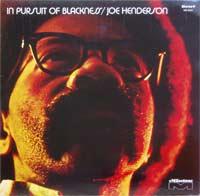
Joe Henderson
In Pursuit Of Blackness
Milestone MX 9034
Stereo
Recorded 1970-1971
Side One
1. No Me Esqueca (*)
2. Invitation (#)
3. A Shade of Jade (*)
Side Two
1. Gazelle (#)
2. Mind Over Matter (*)
(*) Recorded and mixed by ELVIN CAMPBELL
(#) Recorded Live by BERNIE GRUNDMAN
Personnel
*
JOE HENDERSON; tenor sax
CURTIS FULLER; trombone
PETE YELLEN; alto sax (flute & bass clarinet on 'Mind over Matter')
GEORGE CABLES; electric piano
STAN CLARKE; bass
LENNY WHITE; drums
#
JOE HENDERSON; tenor sax
WOODY SHAW; trumpet
GEORGE CABLES; electric piano
RON McLURE; bass
LENNY WHITE; drums
TONY WATERS; conga drums (on 'gazelle' only)
Joe Henderson was one of the great tenor sax players. He cut his teeth in the 1960's playing with the likes of Horace Silver and Herbie Hancock, and as a sideman on literally dozens of Blue Note sessions. He also had a great quintet around 1970, featuring the players listed above. He was certainly becoming politicised at that time (like many other artists of that era) with album titles like this, as well as "Power To The People" and "If You're Not Part Of The Problem...". Unlike some of the more radical players of the time (i'm thinking principally of Archie Shepp here) he didn't head out in a totally free direction, but stayed playing the kind of post-bop sound which made it's first appearance in the music of the great Miles Davis quintet of the late 1960's (circa "Filles de Kilimanjaro").
This album is very much in that vein. It features a number of studio recordings from 1971 (*) as well as a couple of tracks recorded live at the Lighthouse Cafe, Hermosa Beach, California (#) in 1970 (other tracks from this engagement feature on "If You're Not Part Of The Problem..."). Right from the off, with the latin flavoured 'No Me Esqueca' the band are in great form, particularly Joe. He has a great tone, second only to Sonny Rollins in my view, with a big warm sound that fools you by not playing it straight but heading off at all angles. Cables is in excellent form too, with some great supporting play. Unfortunately the momentum is not really continued over into 'Invitation', one of the live tracks. It sounds a little as if the band were taking a breather from something particularly intense. They don't seem to be inhabiting the same universe, never mind stage. Still, 'A Shade of Jade' makes up for it with a strong showing from all concerned.
'Gazelle' kicks off side 2 in fine style - it might be another live track but it leaves the previous live outing in the dust with some of the best playing by the rhythm section on the album. And then comes 'Mind Over Matter'. Oh yes. Some startling free improvisation by the whole band. Yellen conjures up the spirit of Eric Dolphy with his fine bass clarinet and flute playing - the low, rich tone of the clarinet trading lines with Henderson's tenor in the closing passage is one of the finest moments on this excellent album.
Fantasy Jazz now own the rights to the Milestone records back catalogue, and can be found on the web if you want to (and you should) head out and buy a copy of this fantastic album.
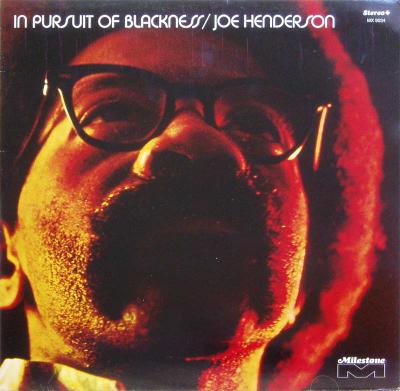
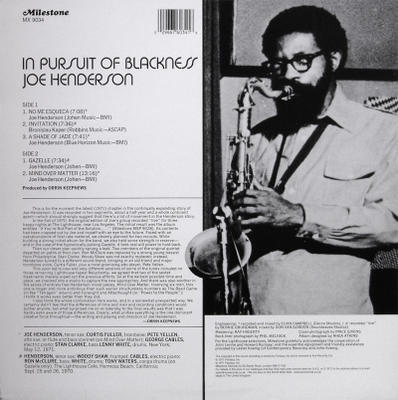
Monday, October 17, 2005
The Not-Quite Daily Jazz
JOHN COLTRANE - The Complete Mainstream 1958 Sessions
A set of recordings that Coltrane made in 1958 with a group comprising Wilbur Harden, Tommy Flanagan, Curtis Fuller, Louis Haynes and Art Taylor. Fantastic playing from Trane throughout. Really shows how he'd moved on in a couple of years from the next one...
JOHN COLTRANE - Tranesition - the complete Paul Chambers Sessions
This is exactly what it says, a complete set of Coltrane sessions from 1956 with the common thread of Paul Chambers on bass and Philly Joe Jones on drums. Think 'Blue Train' and you wouldn't be far off.
CECIL TAYLOR - Hard Drivin' Jazz
More late 1950's sessions featuring Cecil Taylor, before he went totally out to lunch. Has the added bonus of featuring John Coltrane on tenor in the first set.
CECIL TAYLOR - Conquistador!
Cecil after going out to lunch, from the late 60's. Sounds a lot like Don Cherry's 'Symphony for Improvisers' played on the piano.
ALICE COLTRANE - Transfiguration
An interesting (and very free) live set from 1976 with Roy Haynes and Reggie Workman (i think). Great organ sound, she really does sound like no one else.
THE ANDREW HILL JAZZPAR OCTET +1 - The Day The World Stood Still
A 2003 recording of Andrew Hill's band playing live at an awards ceremony (he had just won some sort of 'lifetime achievement' award). He really does give the band lots of room to stretch out and the whole thing comes across as sounding fresh and modern. 'Progressive' in the very best sense of the word.
Time permitting, look out for extended reviews of the above albums (and more) soon.
Sunday, October 16, 2005
Sketches Of Spain Live


Friday night saw a rare treat - a Miles Davis performance. OK, OK, so not a reincarnated Miles but a reverent treatment of the music he performed with Gil Evans.
The performance was a three-way collaboration between the City of Birmingham Symphony orchestra, the BBC big band, and solo trumpeter Jon Faddis (once described by Dizzy Gillespie as "the best ever, including me!"). There's no doubt that all of the musicians were of the highest calibre, and the sound created was just like having Miles and the Gil Evans orchestra in front of you (all the more amazing when you consider that, for 'Sketches of Spain', no parts existed and the conductor had to create all of them from scratch by transcribing from the recording!).
Here's a run down of what was played...
Overture - Part 1: 12 for 12, Part 2: Segments from Miles Ahead and Porgy and Bess - Miles Ahead, Bess, You Is My Woman Now, Gone
Springsville
Sunken Treasure
Prelude to So What
From Birth of the Cool - Jeru, Moon Dreams, Boplicity
Porgy and Bess - Gone
Arab Dance
Interval
Sketches of Spain - Adagio from Concierto de Aranjuez, Will o' the Wisp, The Pan Piper, Saeta, Solea
The pieces were performed by a varying mixture of orchestra and big band depending on the requirements of the individual tune; the selections from 'Birth of the Cool' were performed by a nonet, in the style of the originals, and while they sounded great the massive concert hall was just too big for such a small group to make an impression on.
Highlights? "Springsville" was a much needed boost after a lacklustre overture. It introduced Faddis, who is a technically brilliant trumpeter. His mastery of dynamics was second to none, and his ability to bend notes was simply amazing. The rest of the first half slid by in inoffensice but unexciting style. It would have been a safe bet that a big band arrangement of Tchaikovsky's "Arab Dance" (from the Nutcracker) would be a dog, but they pulled it off, and behind "springsville", this was the highlight of the first part.
The second segment was basically a run through of the whole Sketches of Spain LP. Most of it was pleasant but forgettable (much like the album, in my opinion - you were both capable of so much more than this, Miles & Gil!). But the lead track, and centre of the suite - the 'Concierto de Aranjuez' itself, was worth the price of admission alone. This is where the CBSO could really get into their stride and demonstrate why they're one of the world's leading symphony orchestras. And Faddis was more than a match for them, playing with such passion and vitality that at times you could forget that he was playing his solos off the chart, and imagine that Miles was right there in front of you. Magical. It's just a shame the rest was so humdrum.
So a mixed evening. A reverent treatment of a classic from the Jazz 'canon', but perhaps not the best gig to see if you like your jazz (as I do) a bit more 'progressive' .No doubt my views on 'Sketches of Spain' will be heresy to some, but hey, that's what I think. It's worth seeing anything along these lines again, though, due to the brilliance of the orchestra and the interest inherent in an exercise such as this.
Sunday, October 09, 2005
Elvin Jones & Jimmy Garrison Sextet - Illumination!
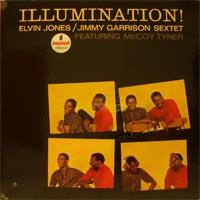
Elvin Jones/ Jimmy Garrison Sextet
Illumination
impulse! A-49
Stereo
Recorded August 8th, 1963
Earphones for cover photo courtesy of Koss Incorporated, Milwaukee, Wisconsin
Side One
1. Nuttin' Out Jones
2. Oriental Flower
3. Half and Half
Side Two
1. Aborigine Dance in Scotland
2. Gettin' On Way
3. Just Us Blues
Produced by BOB THIELE
ELVIN JONES; drums
PRINCE LASHA; clarinet and flute
SONNY SIMMONS; alto sax and English horn
JIMMY GARRISON; bass
CHARLES DAVIS; baritone sax
McCOY TYNER; piano
This is really a very interesting LP. Made in 1963, it's the product of 3/4 of John Coltrane's great 60's band moonlighting on some of their own material, along with some other lesser known but underrated players. Interesting instrumentation, too - the clarinet is often the preserve of dixieland jazz, but can work well in a hard/post-bop setting like this with good effect - as Prince Lasha proves on the opening 'Nuttin' Out Jones', where he trades ever faster and more inventive solos with altoist Sonny Simmons. It's also notable for being, unbelievably, the only date on which Jimmy Garrison recorded as leader (co-leader, in this case).
As mentioned above, it's mostly hard bop with some freer moments - you can think of what John Coltrane was doing on his early impulse! albums such as Coltrane and Impressions and you'd be more or less there. Each track has something to reccomend it. The eastern-inspired melodies of 'Oriental Flower'. The bluesy repeating figures of 'Half and Half'.
Special mention has to be reserved for side 2's opener, 'Aborigine Dance In Scotland'. Alto and baritone saxes playing in unison with the flute create a vaguely bagpipe-ish sound (if you've never actually heard a bagpipe) in which the theme is stated, before a long and utterly fantastic Elvin Jones solo. That man just had incredible rhythmic ideas, I guess he was picking up from both previous drummers such as Max Roach and Art Blakey, and the sort of ideas being passed around by his current boss, John Coltrane.
The following 'Gettin' on Way' is a freeish post-bop track with some great sax and another first rate drum solo. It could almost be Coltrane up there. The LP rounds off with 'Just Us Blues' which does exactly what you expect of a good blues.
This was only Elvin's 2nd date as leader, and he's put together a decent LP. He was to release many more albums under his name for almost another 30 years, many of which are said to be as good as this one. My personal favourite - 1965's 'And Then Again' will be the subject of a future review. Watch this space!
Links
Drummerworld has some great photos of Elvin as well as a biography
Wikipedia has an entry on Elvin with a short discography and links to just about everybody he ever played with or was influenced by
Sadly, Elvin passed away last year. Here's a couple of obituaries from the Guardian and the Times

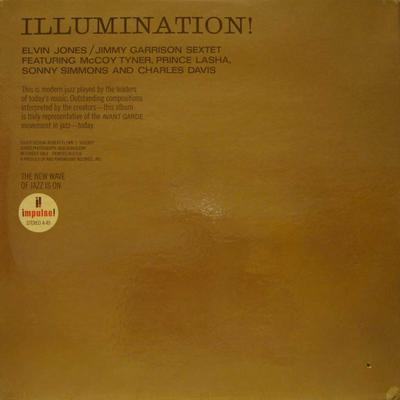
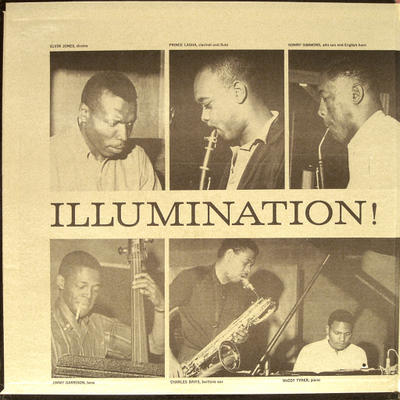
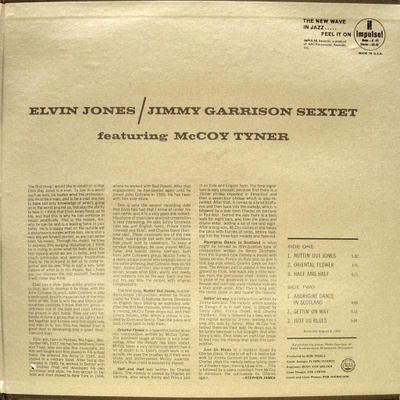
Saturday, October 08, 2005
A Lost Gem - Buddy Rich
Buddy Rich Big Band
Europa Jazz EJ-1009
1981
Produced by Sonny Lester
Side One
1. Three Day Sucker (Lofgreen)
2. Tommy Medley (Townsend)
Side Two
1. On Broadway (Mann-Weil-Leiber-Stoller)
2. Pieces Of Dreams (Legrand)
3. Ease On Down The Road (Schaefer-Wheeler)
4. West Side Story Medley '75 (Bernstein-Sondheim)
Personnel
LLOYD MICHELS, RICHARD HURWITZ, ROSS KONIKOFF, DANNY HAYES, CHARLES CAMIRELLI; trumpet
BARRY MAUR, GERALD CHAMBERLAIN; trombone
ANTHONY SALVATORI; bass trombone
PETER YELLIN, BILL BLAUT; alto sax
STEVE MARCUS; soprano/tenor sax
BOB MINTZER; tenor sax
ROGER ROSENBERG; baritone sax
GREG KOGAN; piano
WAYNE WRIGHT, CORNELL DUPREE, CLIFF MORRIS; guitar
BEN BROWN; bass
RAY ARMANDO; congas
BUDDY RICH; drums
Any way you look at it, 1981 should not have been a good year for Buddy Rich's music. He was in his 60's, after all, and having been regarded as one of the greatest drummers of the swing era, might even be said by some to be past it.
But, on this obscure LP - no name, very little information about the recording apart from titles and personnel - he has one standout track, one that made my jaw hit the floor with delight on hearing it.
Track 1, side 1. 'Three Day Sucker'. Even the title's great. It's basically a fast, funky workout for the horn section and guitars. Buddy doesn't really feature until a short solo at the end. It's just exactly what could happen when those late 70's/ early 80's big bands decided to get all raunchy. Imagine Elvis' Vegas band in their funkier moments, multiplied by 10, and you're almost there.
It would be great if the rest of the album lived up to this, but it doesn't. The 'Tommy' medley is unrecognizable (good!), and most of side 2 is utter tosh. The closing 'West Side Story Medley '75' is quite interesting with it's unusual time signatures and odd harmonics - probably more to do with the Bernstein composition than this particular arrangement, though.
I found a copy of this on the web for $4.50. If you see one as cheap, buy it, I guarantee you won't regret it (until track 2, anyway).
Here's some great shots of Buddy from the same era as this LP;
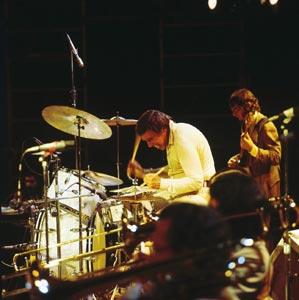
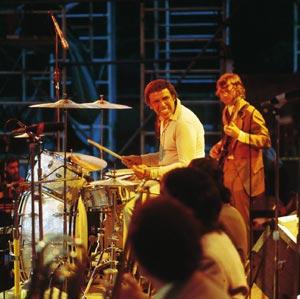
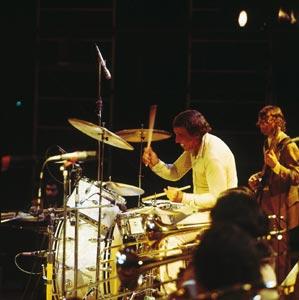

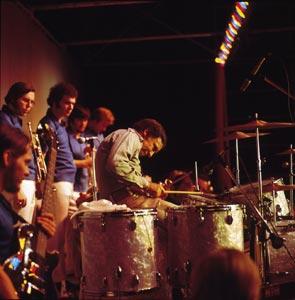
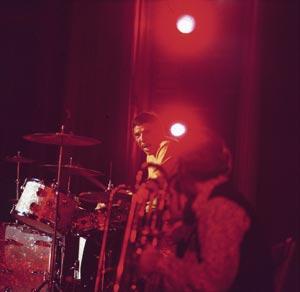
All of these pictures are taken from the Buddy Rich official website
Friday, October 07, 2005
Buddy Montgomery - This Rather Than That
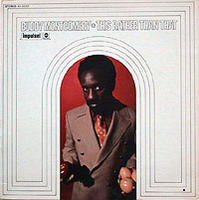 Buddy Montgomery
Buddy Montgomery This Rather Than That
impulse! AS-9192
Stereo
Recorded at Universal Recording Corporation, Chicago, September 10 and 11, 1969
Produced by ED MICHEL
Side One
1. This Rather Than That (Buddy Montgomery)
2. Tin Tin Deo (Chano Pozo)
3. Rose Bud (Buddy Montgomery)
4. Stormy (B. Boni - J.R. Cobb)
Side Two
1. Willy Nilly Blues (Buddy Montgomery)
2. Beautiful Love (Victor Young - Wayne King - Egbert Val Alstyne - Haven Gillespie)
3. Didn't We (Jimmy Webb)
4. Winding Up (Buddy Montgomery)
Personnel
BUDDY MONTGOMERY, piano and vibes
MELVIN RHYNE, organ
JODIE CHRISTIAN, organ
MANTY ELLIS, guitar
MONK MONTGOMERY, fender bass
JIMMY ROWSER, bass
GEORGE BROWN, drums
This is the bizarrest release i've come across on the Impulse! label yet - because it's the least bizarre, by a long way - an album of no holds barred soul jazz performed by a man who could well earn the title of "The Jimmy Smith of the Vibraphone". A suitable title for him, too, considering that his brother Wes had recorded the excellent 'Dynamic Duo' LP with Jimmy a few years before. There's also a third Montgomery brother playing jazz - Monk - who appears here on Fender Bass
I'd always thought of Impulse! as trailblazers, knocking down conventional Jazz thinking in the quest for musical purity, but this doesn't fit in with that ideal at all. Plus, this album was recorded in 1969, right at the time that Pharoah Sanders and Archie Shepp were making the sort of free space-jazz that attracted me to the label in the first place.
Once you get over the initial surprise, this is a surprisingly good album. The first track is really the standout. It starts off with some restrained vibes then abruptly kicks into a low down funky riff on the organ and fender bass that keeps up throughout the track. Buddy solos on top of the organ with the sort of single lines that wouldn't sound out of place on a Jimmy Smith album - or even a BB King guitar solo. 'Tin Tin Deo' is more of the same, just at a slightly slower pace, and with some great changes of tempo around the chorus sections.
Skip past the overly sentimental 'Rose Bud' and there's a lovely latin feel to 'Stormy' with some great unison lines between Buddy and Manty Ellis on guitar. 'Willy Nilly Blues' is just that - a blues - taken at a decent tempo with a great repeating rhythmic figure and some nice playing from all the soloists. 'Beautiful Love' is another ballad which comes off better than 'Rose Bud' - it's a bit less sickly sweet and has some nice organ. 'Didn't We' is an unaccompanied piano solo by Buddy that again errs on the side of gloopiness. It's worth sitting through for 'Winding Up' - another blues in the style of 'This Rather Than That' with great organ vamps throughout.
So a decent album - if you forget about the overly smooth ballads - occupying an odd position on one of Jazz's more experimental labels. Well worth a listen.
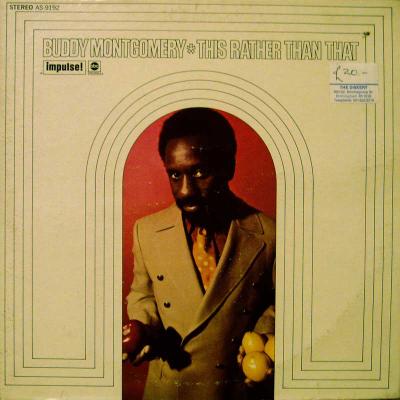



There's not much else to say about this - you can read the sleeve notes above, but the internet has little to say about this album. Perhaps if it was reissued on CD it might get more attention?
Buddy Montgomery site - with nothing about this LP - but it does feature this fine (if a little small) picture of Buddy having lunch with Percy Heath and Milt Jackson. It's like the Jazz Monkees, or something...

Buddy Montgomery at allmusic.com
Thursday, October 06, 2005
Karl Berger - Tune In
Tune In
Milestone Records MSP 9026
Recorded July 30th, August 12th 1969 at Plaza Sound Studios (NYC)
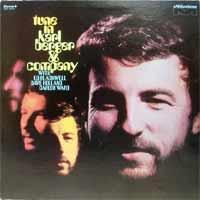
Side One
1. Tune In
2. With Silence
3. Get Up
4. Fly
5. Beyond The Moon
Side Two
1. Clarity
2. Never The Same
3. From Now On
4. Tune In
All selections by Karl Berger
Personnel
KARL BERGER; vibraphone (and sarangi on 'fly' and both versions of 'tune in')
CARLOS WARD; alto sax & flute
DAVE HOLLAND; bass
ED BLACKWELL; drums
Vibes. We've all been there. We all know what vibe jazz sounds like - which is great, of course, but sometimes I long to hear the vibes played in a style other than Milt Jackson's. This is where Karl Berger comes in. Yes, he plays vibes, but with the freedom of expression and harmony that marks out all great avant-garde jazz. He's surrounded himself on these sessions with a group of fine musicians who had already made their mark in other areas of the avant-garde. Ed Blackwell had played with Ornette Coleman on his Free Jazz experiments, Carlos Ward was a member of John Coltrane's 1965 octet, while the young Dave Holland had recently recorded 'In A Silent Way' with Miles Davis.
'Tune In' kicks off with a revolving vibes figure sounding uncannily like 'tubular bells' before Carlos Ward enters on flute and the rhythm section start to do their thing - it's very much in time - there are rhythmic rules being adhered to - although the time signatures keep on changing giving the piece a feeling of unease that's soon resolved when the drums lay out and Dave Holland lays down a complex solo - well, not a solo as such, as an extended theme which almost but not quite gets back to where it started. Karl gets his sarangi out, too (it's an indian classical instrument - follow the link above...) at this point, it's otherworldly sound mingling well with the bass line. The whole feel is not dissimilar to that of Eric Dolphy's 'Out To Lunch'.
'With Silence' is suitably silent, really nothing more than an extended vibes solo with the others chipping in occasionally. Where the album gets really exciting, though, is with 'Get Up', which is a bit like (no, VERY like) John Coltrane's 'countdown; arranged for vibes - similar pace, similar frantic soloing, similar ability to make your jaw drop at the sheer technical skill involved in making something like this work. And a fantastic drum solo, too.
The album goes on in this vein, 'Fly' being very similar to the preceding track until the sarangi breaks in and an air of tranquility settles over the group that lasts through to 'beyond the moon' - briefly - until Carlos (he's been a bit quiet up till now) gets a chance to strut his free stuff and then share some lovely unison lines with Karl.
Did I mention the singing? It's very (very) low in the mix and only really audible through decent headphones. It sounds a lot like Karl being picked up through the mic on his vibes - he's basically singing along with his melody in an incredibly high pitched sort of doo doo sound which makes him sound quite, quite mad.
He's an elusive chap, too. He has got a website which has some information about what he's been up to in the last few years, but unfortunately makes no attempt to talk about earlier glories. This LP is a bit of a mystery, too, with precious little information about it being available online. Most of what i know about it comes from the sleevenotes - see below. But never mind that, I've got it, and soon they'll be coming from far and wide to read my review...
Back to the music - side 2 begins in full on free jazz mode with 'clarity', again featuring some superb soloing from Dave Holland. What a bass player. He's got to have at least 7 fingers on each hand to play like that! 'Never the Same' is a bit of a test of the listener - it's basically just Karl and Carlos playing off each other but doesn't quite come off, somehow, it's almost like all the magic has gone out of the group. 'From Now On' does a great hard bop impression, with a faintly familiar theme (possibly a Coltrane number? It'll come to me one day) followed by everyone getting some decent solo space. And finally, the album rounds off with another take of 'Tune In', following much the same recipie as the previous version.
So there it is. 40 minutes of outstanding avant-garde vibes playing with first-rate musicians providing backup. What more could any jazz fan ask for that this?


Karl Berger; http://www.karlberger.com/
Karl Berger at allmusic.com; http://www.allmusic.com/cg/amg.dll?p=amg&uid=CAW050510061051&sql=11:wyg9kent7q7q~T1
Wednesday, October 05, 2005
Tord Gustavsen Trio - Live
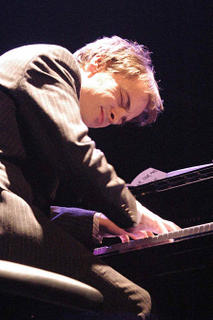
I had the great pleasure of going to see Tord Gustavsen and his trio
(Harald Johnsen on Bass and Jarle Vespestad on Drums) last night at the
MAC in Birmingham. What a splendid evening's entertainment it was too.
This was the first time i'd heard their music - i was attracted by the
idea of them being in some way similar to the Esbjorn Svensson Trio who
I greatly admire.
The omens were good - the theatre was packed out and it was good to find
myself sitting in the second row with a clear view of all the
instruments on stage. I was a little concerned when the band came on -
Tord reminded me for a moment of Mr. 'Crimes against Jazz' Jamie Cullum
- but it was immediately obvious that I was in for a night of great
music.
Ah yes, the music. They've been described as 'meditative', 'intense' and
'soulful'. Another word might be 'slow' - the tempo rarely increased
beyond mid-pace - but who cares about speed when a performance is as
intense as this one. Right from the start, it was clear that Tord was in
a different place to the rest of us. He spent much of the concert with
his head bent low, almost touching the keyboard, letting out moans of
delight during particularly emotional passages. Between pieces his voice
gave the impression of someone who had just woken up - or at least been
dragged back from the further regions of his consciousness. He was
clearly improvising - but yet his playing retained it's restrained
quality and was melodic and well-behaved harmonically throughout. So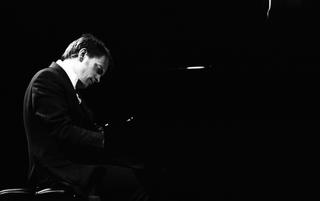
much so that you could imagine the whole thing being transcribed and
played back by a classical pianist. That's not a criticism - in fact,
the ability to keep such restraint while clearly being consumed by the
intensity of the music is a mark of a great talent.
I've said a lot about Tord but not much about the others yet. The sad
thing for them is that this is definitely the Tord Gustavsen Trio. They
didn't get much solo space at all, which is a shame as when they did
they showed themselves to be excellent musicians. Jarle, the drummer, in
particular, showed enormous skill in setting the dynamic of most pieces.
He could go from hushed to waking the dead over an extended period
without ever making you think he was doing anything different - in fact
on several occasions, after a hushed section I would suddenly think,
"when did this get loud?", so gradual was the increase in volume. He
also played a cymbal solo with brushes that was so delicate, he was
hardly even touching his kit. At other times he put his sticks away
completely and played with his hands, to reach the level of tranquility
that the music at times required. Harald on the bass also showed himself
to be a skilled, if somewhat conventional bassist with a decent solo
later in the set.
Now, you might get the impression that all was quiet and peaceful in the
MAC last night - far from it. At times the music welled up to epic
sounding crescendos, with Tord playing like a man possessed - on his
feet (face still millimeters from the keys), pounding away at the
keyboard like he wanted to take it outside and give it a good seeing to.
Even though the playing got fast and loud, his technical skill kept it
all together. Sitting where I was, i could see every movement his hands
made and was constantly amazed that the blur of fingers I could see was
producing the same music I was hearing.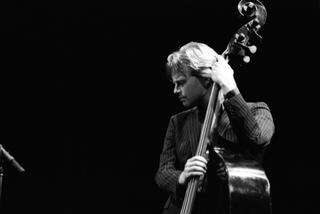
A great night's music, certainly. The audience certainly thought so -
there was little room for head nodding or foot tapping throughout the
more cerebral sections, but the applause at the close of the concert
almost took the roof off the small venue. When the band came back out
for their encore, they showed themselves not to be frightened of sonic
adventures, with Tord damping his piano strings with his hands to create
all manner of weird and wonderful sounds from his bosendorfer grand.
All that remains to be said is this - there was a man outside afterwards
selling the band's new CD. Did I buy one? Silly question. Should you? On last
night's performance - absolutely. Watch this space, there's a review of
the album to come...
Tord Gustavsen Trio
Saw these lot playing last night - no time to write now but here's an review from the Observer of their most recent album...
Tord Gustavsen Trio, The Ground

***** Melancholia is marvellous - and quiet, says Stuart Nicholson
Sunday February 20, 2005
The Observer
The music biz long ago rendered terms like 'excellent' or 'very good indeed' meaningless. A shame, because when someone does emerge who really is 'very good indeed', it's now necessary to reach for the kind of superlatives that would do justice to the Second Coming.
But in the case of Norwegian pianist Tord Gustavsen, no hype is necessary. His debut album, 2003's Changing Places, was an unexpected bestseller not because of any media campaign (there was none) but through word of mouth: a small sign in this Big Mac society of ours that there's a way of bypassing the culture we get to reach the culture we deserve.
The Ground takes up from where Changing Places left off and wallows in those feelings of faint melancholy you get when gazing out of the window on a wet Sunday afternoon. Gustavsen is a pianist of poetic cast, an exceptionally lucid player with a sure sense of melodic structure and an often astonishing lyrical imagination. Together with bassist Harald Johnsen and drummer Jarle Vespestad - who follow the precise contours of his compositions with unflappable taste - he creates music rich with inner meaning and nuance.
And if there was an award for the quietest band in the world, Gustavsen's Trio would win it hands down. Their self-imposed dynamic range, from an I-can't-quite-hear-you pianissimo to a that's-a-bit-better mezzo piano, draws you into their music in the same way that you instinctively lean forward to hear a conversation conducted in hushed tones.
Spellbinding stuff.
Burn it: 'Edges of Happiness'; 'Token of Tango'
Tord Gustavsen Links
Tord Gustavsen Trio website; http://www.tordg.no/trio
Tord Gustavsen at ECM records; http://www.ecmrecords.com/Catalogue/ECM/1800/1834.php?lvredir=712&catid=0&doctype=Catalogue&rubchooser=901&mainrubchooser=9&acat=Artists%2FGustavsen+Tord%23%23Tord+Gustavsen
Tuesday, October 04, 2005
Today's Music
Not much time to write today, so just a brief entry. Been listening to 2 albums today with very different styles. John Coltrane's 'Impressions' was one of the first he recorded for the Impulse! label and features his most of his eary 60's quartet (Elvin Jones, McCoy Tyner and Reggie Workman in place of Jimmy Garrison) on some of the tracks. The title track is particularly good, an extended improvisation with lots of exploration by JC. You can really feel him pushing the boundaries as he plays. The drumming on that track is mind-blowing, really wild but yet rhythmic and propulsive at the same time. I'm not sure if it's Elvin or Roy Haynes, will check and report back later!
The other album is the Esbjorn Svensson Trio's 'Seven Days of Falling' which is much more laid back in it's approach, but the performances are no less committed. Very nice. I'll say more about both later, but to keep this the 'daily' jazz i thought i'd better post something!
Monday, October 03, 2005
Pharoah Sanders Live!

'Living legend' Pharoah Sanders played a brief 3 date UK tour last week, stopping off in Birmingham on Firday October 30th. In the rarified atmosphere of the CBSO centre (the orchestra practice space, I believe) we were treated to 2 hours of classic jazz from Pharoah and his band. He'll be 65 now (born in 1940 i think) and is certainly past his best in terms of fitness. On a few occasions he produced the kind of sounds he became famous for in the late 1960's - he can certainly still control his sqwauking - but it was hard work for him and later in the set he played his sax less and less.
When he did play, though his tone was wonderful - helped by some excellent acoustics in the hall, no doubt - and the intensity of his playing was not in doubt. Sadly I arrived a few minutes late, but was just in time to hear a stellar version of John Coltrane's 'lazybird' with Pharoah doing his best 'sheets of sound' impression. That was followed by a slower number which nearly put Stewart to sleep, and then he played a truncated 'the creator has a master plan' - emphasising the intro over the longer groove section. Fantastic, it was, but a bit of an anticlimax when he stopped just after the main 'a love supreme' riff came in.
The second set kicked off with a version of 'my favourite things' which was, for me, the highpoint of the evening. Not because of Pharoahs' playing - which was great altho
That was followed by a calypso-ish number, with pharoah enjoying himself to the full with some impromptu scat singing down the wrong end of his sax! Another great group performance. And finally, a track with pharoah on vocals - something about 'save our children' - this was the name of a recent (1990's) album so i wonder if the track comes from that? It was ok, pretty low key, though.
All in all, a night of good music and entertainment (almost as much fun was had spotting the bored other halves in the audience!) The venue had it's pros and cons, though. I've already mentioned the quality of the acoustics - it was a bit like sitting at home with a high end stereo and listening to the record - and that was also the problem. It was a bit clinical. As atmospheric as the moon. Perhaps 'polite' is a good word?
Still, a good night in total - it's always great to see a 'living legend' even if they don't live up to their heyday. The other great thing about it was the realisation that there's actually a lot of jazz going on in birmingham these days - something to watch out for for the future.
Pharoah Sanders Links
A pharoah sanders page; http://members.aol.com/ishorst/love/sanders.html
Pharoah Sanders at Impulse! Records; http://www.vervemusicgroup.com/artist.aspx?ob=per&src=prd&aid=2663
